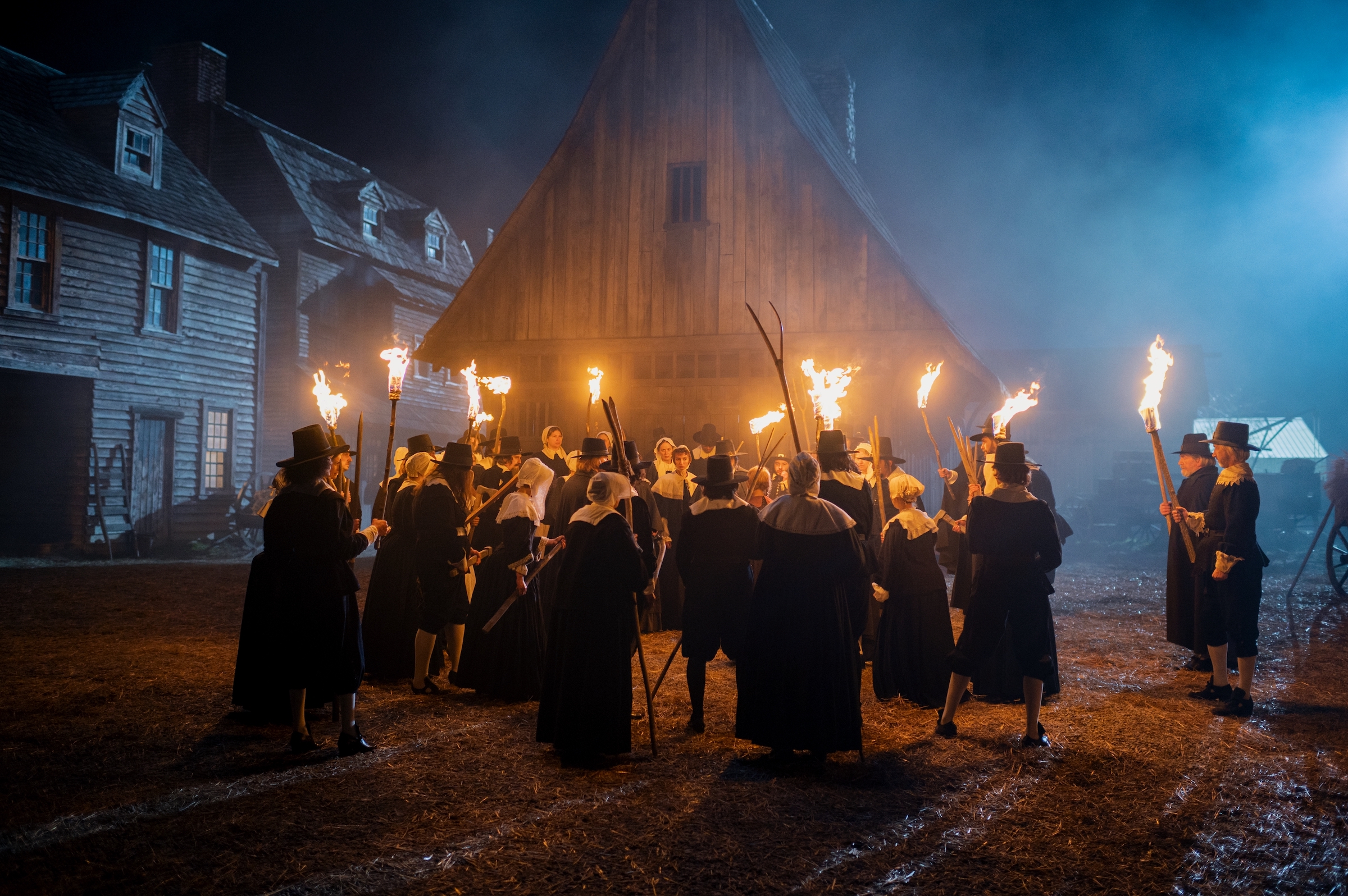
In 1993’s Addams Family Values, Wednesday Addams (Christina Ricci) has been sent away to summer camp, and she is not happy about it. To make matters worse, the camp counselors have written a Thanksgiving-themed play in which they are forcing her to participate, cast as Pocahontas. Wednesday’s nemesis, the obnoxiously chipper Amanda Buckman (Mercedes McNab), stars as the “beautiful and kindly pilgrim lady” Sarah Miller, who has invited Pocahontas’ tribe to the supposed first Thanksgiving. At the last second, Wednesday breaks from the script.
“Wait,” she says, deadpan. “We cannot break bread with you.”
“You have taken the land which is rightfully ours,” she continues. “Years from now, my people will be forced to live in mobile homes on reservations. Your people will wear cardigans and drink highballs. We will sell our bracelets by the roadsides. You will play golf and enjoy hot hors d’oeuvres. My people will have pain and degradation. Your people will have stick shifts. The gods of my tribe have spoken. They have said, ‘Do not trust the pilgrims—especially Sarah Miller.’”
With that, she declares that she will scalp the pilgrims and destroy their village. All hell breaks loose as members of Pocahontas’ tribe of misfits run amok, setting the pilgrim village ablaze.
This iconic scene—seared into the cultural memory (of millennials, at least) although its stereotypes have aged poorly—epitomizes Wednesday Addams’ acerbic sense of justice. And it inspired Miles Milar and Al Gough, the showrunners behind Wednesday, the Netflix horror-comedy series starring Jenna Ortega which is out on Nov. 23. The show is the latest take on a family that first appeared in New Yorker cartoons in 1938, followed by the beloved ‘60s TV show and the ‘90s adaptations starring Ricci, Anjelica Huston, Raúl Julia, and Christopher Lloyd.
“People know her from that moment. So how do we extrapolate that?” says Milar, who along with Gough answered that question with a premise that involved colonial Americans as oppressors. “It felt very effortless to put her in a pilgrim idea. It was very organic to the Addams family.”
The Addams Family roots
No matter the time period in which they’re portrayed, members of the Addams family have always been viewed as outsiders. To their neighbors, they’re creepy and they’re kooky, they sound funny, they dress oddly, they eat strange foods: they’re a perfect allegory for immigrant families.
Milar and Gough decided to finally make this explicit after years of being implied. In the Netflix show, Wednesday’s newfound psychic visions introduce us to one of Gomez’s ancestors from Mexico, Goody Addams, who started a secret society to “protect outcasts from harm and bigotry.”
When Wednesday was in development, the idea of “outcasts” versus “normies” came even before that of critiquing colonialism. The concept of celebrating those rejected by society sprang directly from Charles Addams’ cartoons. “In some form, the Addams were always disruptors in a normal world,” says Gough. “The Charles Addams cartoons were a reaction to the ‘50s America: the white picket fence and the house. It’s a little subversive, but also pointing out that it’s also kind of bullsh-t.”
In Wednesday, says Milar, “It’s an allegory for racism and prejudice and all those things that we’re dealing with now. And I think that’s the interesting thing about genre shows: That you can—not in a sledgehammer way, but in a way that’s buried—talk about real issues that are affecting the modern world.”
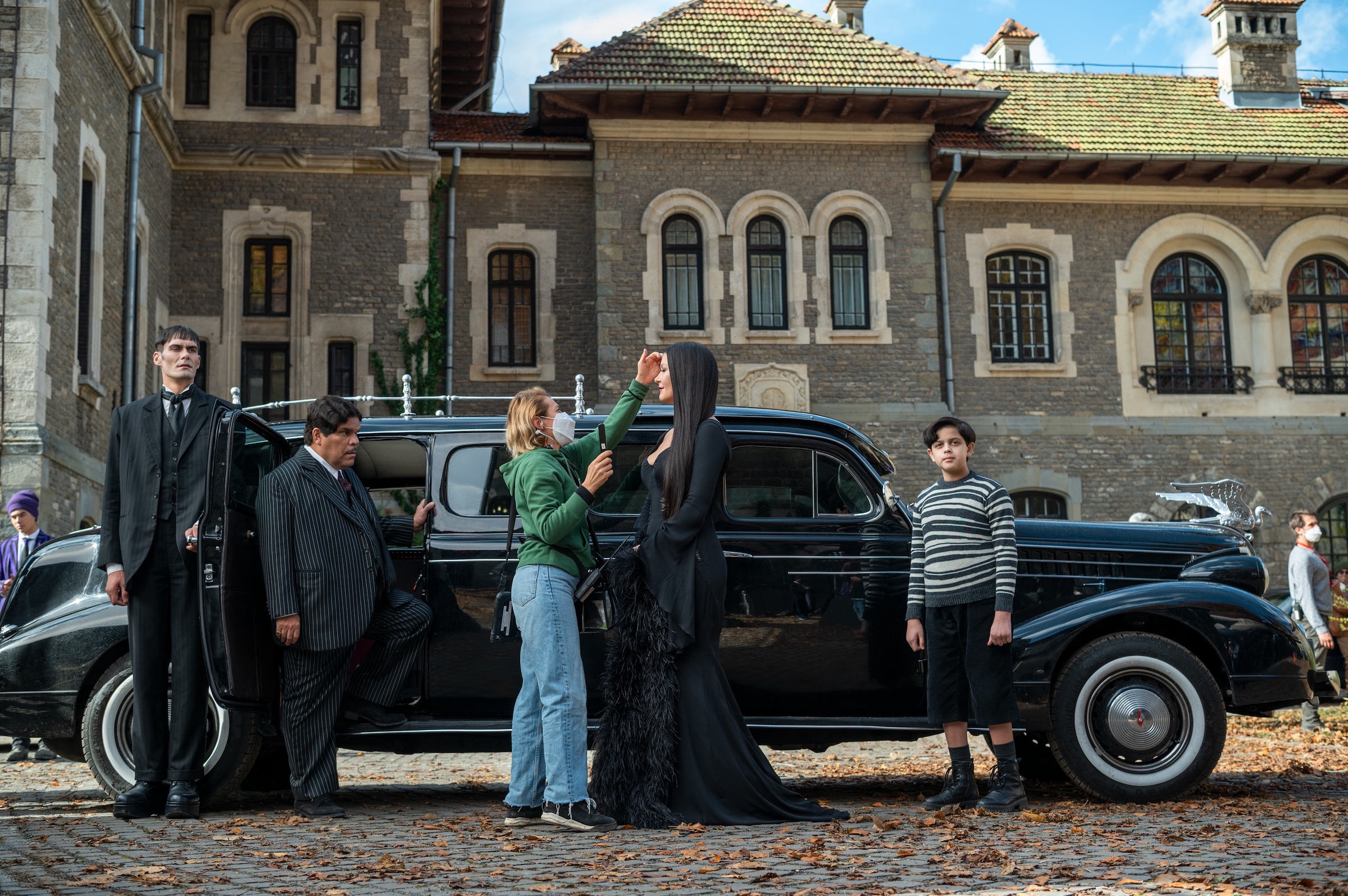
Outcasts and immigrants
One of the issues that Wednesday addresses—which pairs well with its critique of colonialism—is immigrant identity. In the 1991 film The Addams Family and its 1993 sequel Addams Family Values, Puerto Rican actor Raúl Julia played Gomez Addams, Wednesday’s father. Since then, some have viewed the Addams family as canonically Latino—a view affirmed by Wednesday’s casting of Puerto Rican actor Luis Guzmán as Gomez and Mexican and Puerto Rican actor Jenna Ortega as Wednesday.
“Wednesday is technically a Latina character, and that’s never been represented,” Ortega said in a behind-the-scenes video. “Any time that I have an opportunity to represent my community, I want that to be seen.”
Milar says that while they considered many actors for the lead role, they always hoped to cast a Latina actor. “That was always our goal. We wanted to make sure we didn’t leave any stone unturned. And obviously Jenna was Latina, but also she was the best actress, by far, for the role.”
In the first episode of Wednesday, a mournful rendition of La Llorona plays on the gramophone in Wednesday’s dorm room as she clacks away on her typewriter. When the Addams come to visit for Parents’ Weekend, Wednesday’s younger brother Pugsley (Isaac Ordonez) sucks on a tamarind candy. “It’s not hammered over the head, but there are moments,” says Milar. “The choices of music she plays and food. It’s subtly laid in that she is also American; she’s the daughter of immigrants. Because Gomez grew up in Mexico.”
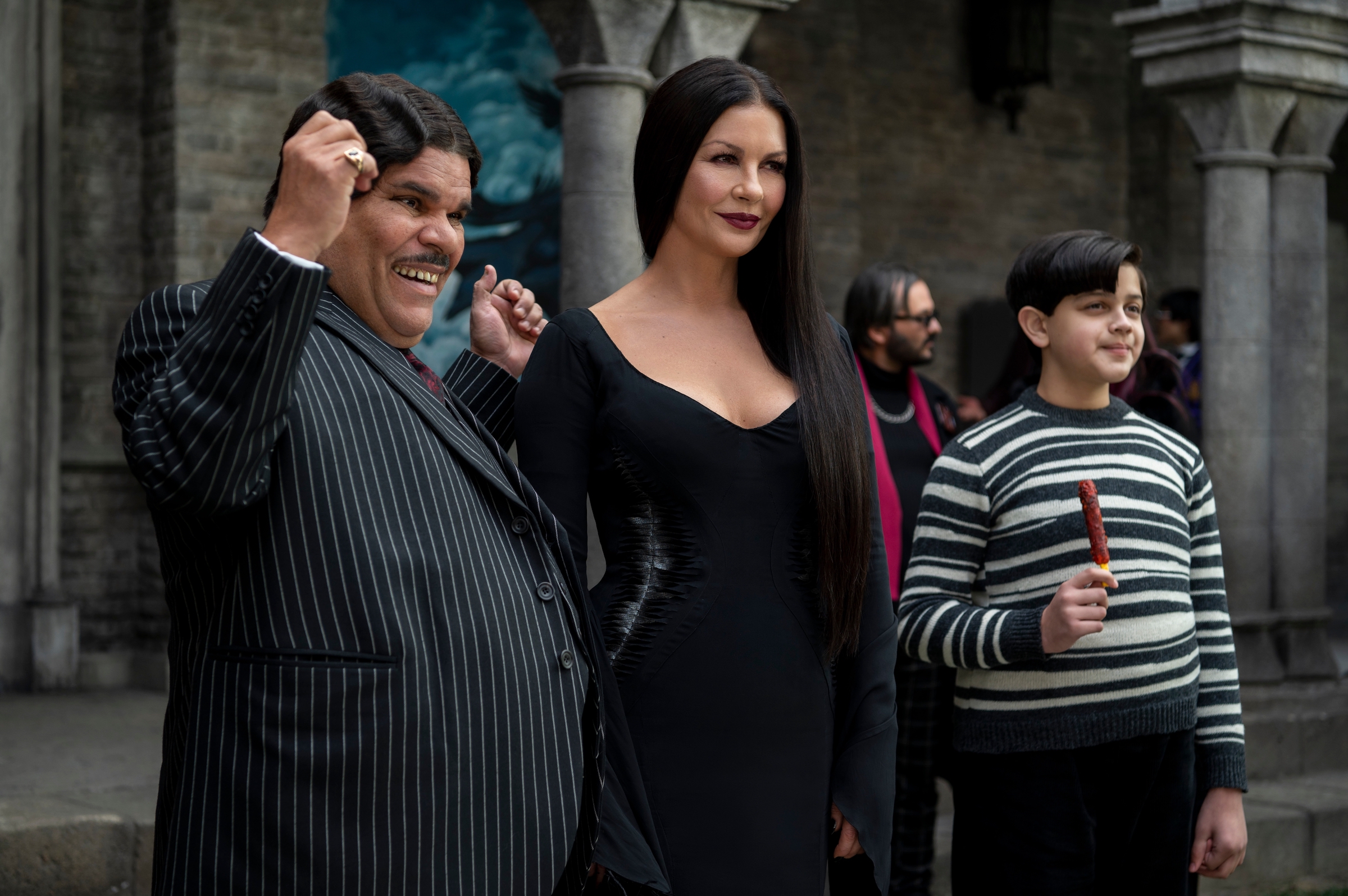
An Addams Family Thanksgiving
The show’s release date set for late November rather than October may have surprised some, given the gothic family’s longtime association with Halloween. But the Addams family also holds a strong connection to both anti-colonialism and Thanksgiving, at least since the 1993 movie.
Wednesday’s pilgrim storyline flashes back in time to a fictional settler named Joseph Crackstone who founded Jericho, the Vermont town where much of the show unfolds, in the early 1600s. Jericho sits adjacent to Nevermore Academy, the school that Wednesday attends alongside werewolves and vampires. And Pilgrim World, a modern living-history museum that offers daily witch trials, describes Crackstone, much like Sarah Miller, as “beloved and pious.”
On Outreach Day—intended to improve relations between Nevermore “outcasts” and Jericho “normies”—Wednesday is forced to volunteer with her classmates serving free fudge samples at Pilgrim World.
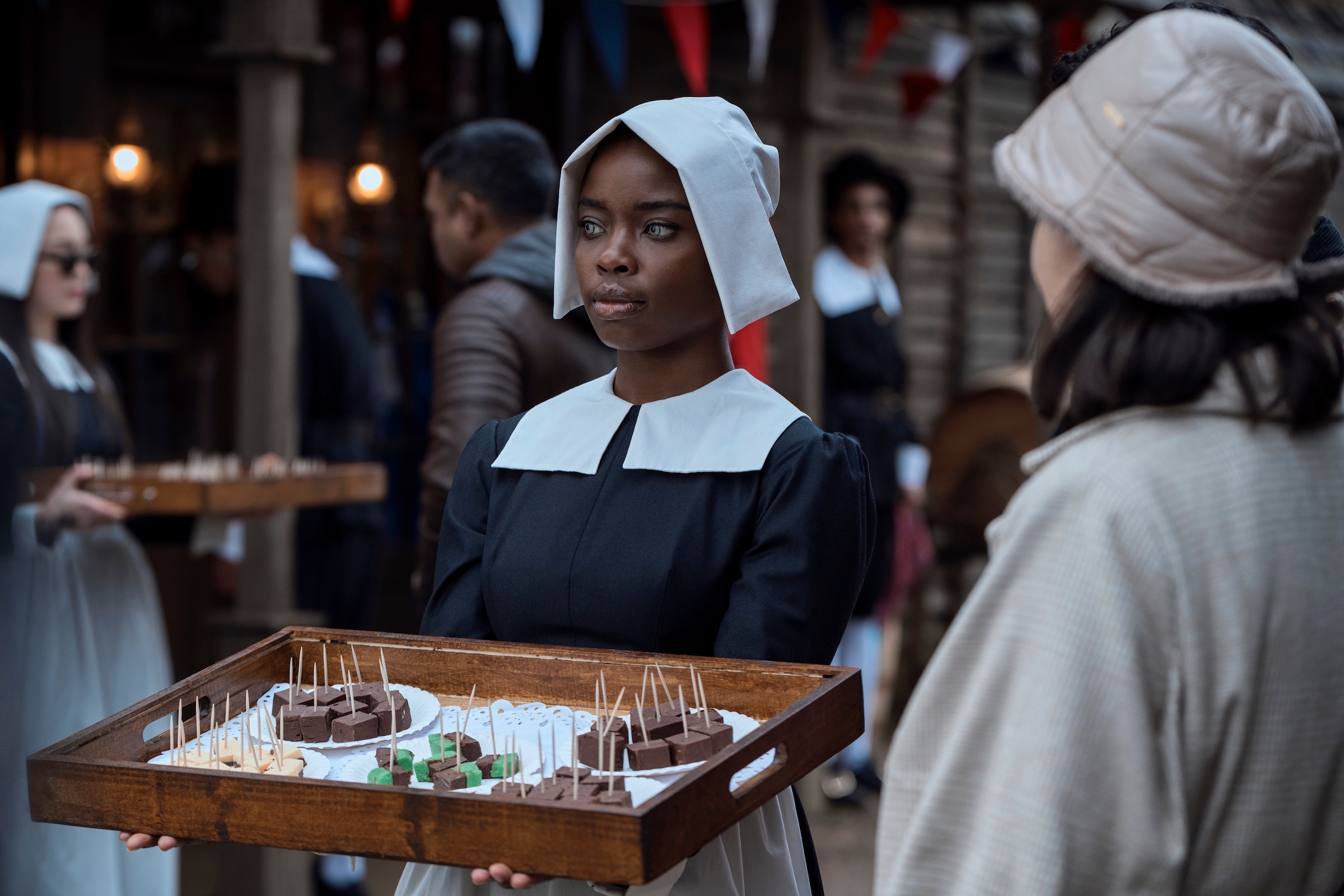
“Enjoy your ‘authentic’ pilgrim fudge made with cacao beans procured by the oppressed Indigenous people of the Amazon,” she tells a group of tourists in fluent German. “All proceeds go to uphold this pathetic whitewashing of American history. Also, fudge wasn’t invented for another 258 years. Any takers?”
“Our first idea was that Thanksgiving was a time the pilgrims invited the outcasts and then murdered them,” says Gough. “That just felt like a very Addams family kind of approach. So that’s something that was very much in the DNA—and then obviously plays through the whole mystery of the show.”
Joseph Crackstone, as Wednesday soon discovers, swore to persecute all outcasts. In true fire-and-brimstone style, he rounded up the oppressed of the settlement—from those accused of witchcraft to immigrants, including an Addams family ancestor—shackled them to the floor of a barn, and lit the whole thing on fire. In the present day, Wednesday retaliates by burning down a new memorial statue of Crackstone—freshly dedicated on Outreach Day—in the town square.
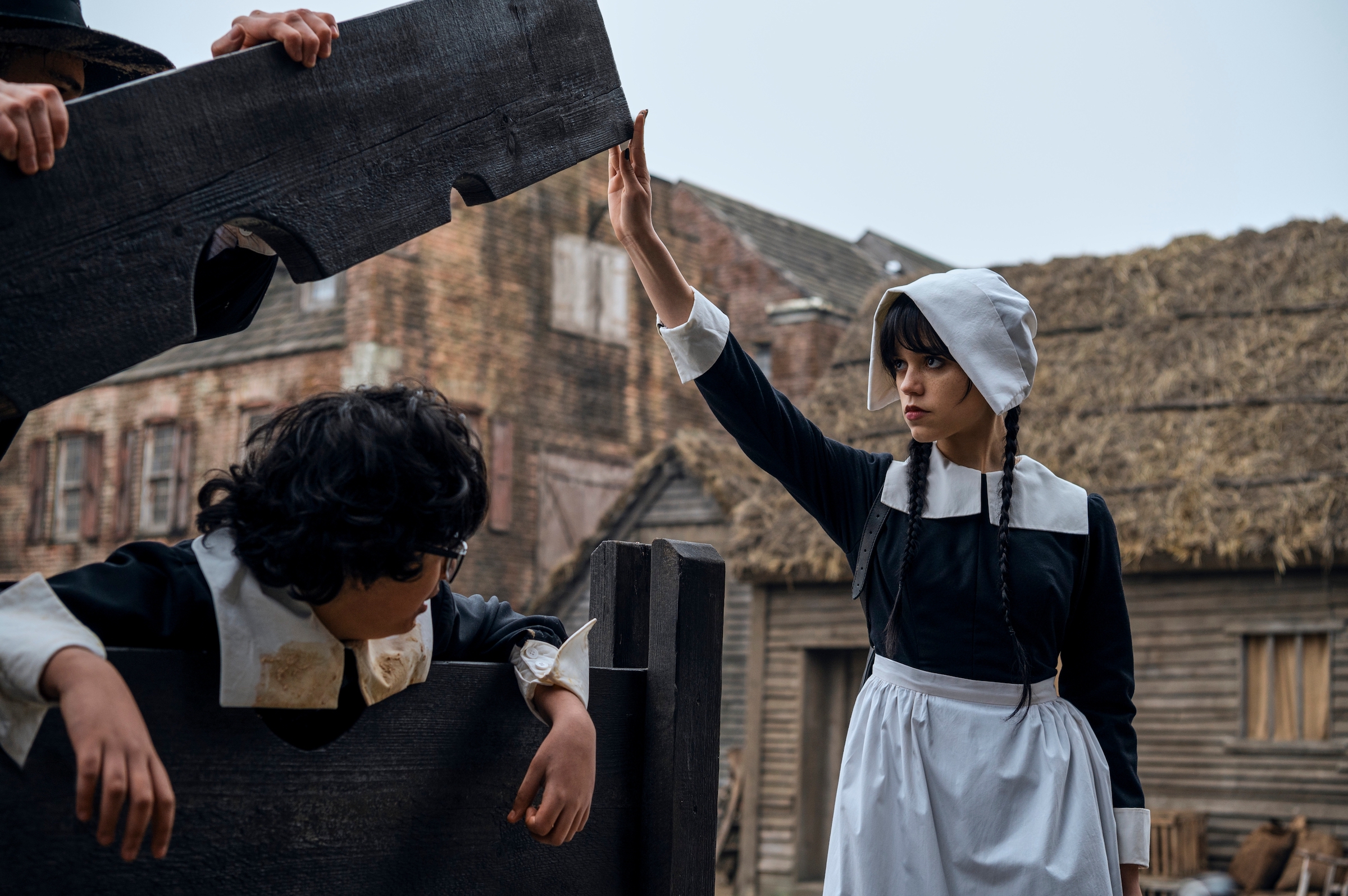
Gough grew up in southern Maryland, where there was an early settlement, not unlike Pilgrim World. He visited colonial Williamsburg as a kid. Tim Burton, who co-created and co-directed the series, went to similar attractions in Massachusetts and New England when he was researching 1999’s Sleepy Hollow.
“It was something that was always fascinating to see, but then once you learn the real history, you realize, ‘Oh, OK, it’s being told from a certain point of view,’” says Gough. “We wanted to disrupt that point of view and have Wednesday be a key point.”
TV shows about dysfunctional families abound: Succession, Arrested Development, Yellowstone, Game of Thrones, Empire. Few fictional families, though, are functional—and even fewer love each other fiercely for their differences.

“Especially when you’re going into the holidays—when people have to get together and that’s always so stressful—there’s divisions for whatever reasons,” says Gough. “I think people ultimately wish, ‘Oh, I wish we could go to Thanksgiving and all just get along and celebrate our differences and be empathetic to them.’”
Enter: the Addams family. Created as the ultimate outsiders, Wednesday, her brother Pugsley, and their parents Morticia and Gomez are, in fact, timeless and aspirational in their closeness.
“We wanted to lean into that part of the Addams family,” says Gough of the immigrant identity. “A lot of it people had assumed, but it hadn’t really been explored. And the beauty of an eight-hour show is that you get to explore.”
More Must-Reads from TIME
- Cybersecurity Experts Are Sounding the Alarm on DOGE
- Meet the 2025 Women of the Year
- The Harsh Truth About Disability Inclusion
- Why Do More Young Adults Have Cancer?
- Colman Domingo Leads With Radical Love
- How to Get Better at Doing Things Alone
- Michelle Zauner Stares Down the Darkness
Contact us at letters@time.com



